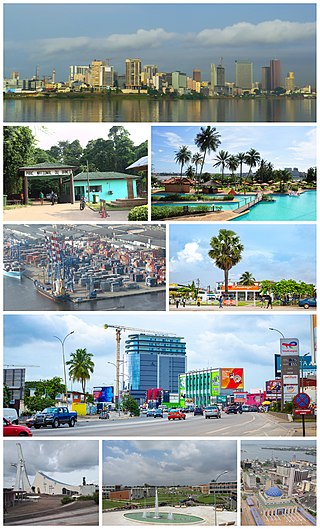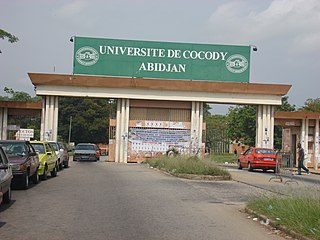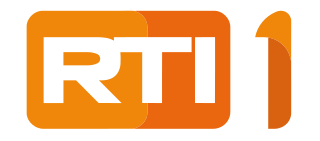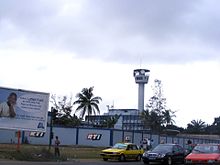
Charles Blé Goudé is an Ivorian political leader, born at Guibéroua, in the centre west of the country. He was acquitted by the International Criminal Court on the 15th Jan 2019 of crimes against humanity allegedly committed in Côte d'Ivoire during the presidency of Laurent Gbagbo.

Opération Licorne was a French Armed Forces peacekeeping operation in support of the United Nations Operation in Côte d'Ivoire. The French forces had been stationed in the country since shortly after the outbreak of the Ivorian Civil War. The troops' main mission was to support the United Nations peacekeeping mission and to ensure the security of French and foreign nationals.

Radiodiffusion-Télévision ivoirienne (RTI) is the publicly owned radio and television authority of Côte d'Ivoire. It is financed through a combination of television and radio licences, advertisements, and taxes.
Telecommunications in Ivory Coast include radio, television, fixed and mobile telephones, and the Internet.

The 1999 Ivorian coup d'état took place on 24 December 1999. It was the first coup d'état since the independence of Ivory Coast and led to the President Henri Konan Bédié being deposed.

Abidjan is the largest city and the former capital of the Ivory Coast. As of the 2021 census, Abidjan's population was 6.3 million, which is 21.5 percent of overall population of the country, making it the sixth most populous city proper in Africa, after Lagos, Cairo, Kinshasa, Dar es Salaam, and Johannesburg. A cultural crossroads of West Africa, Abidjan is characterised by a high level of industrialisation and urbanisation. It is also the most populous Dioula-speaking and French-speaking city in Africa.

Université Félix Houphouët-Boigny (UFHB) is an institution of higher education located in the Cocody section of Abidjan and the largest in Côte d'Ivoire. With over 50,000 students, the UFHB has 13 faculties and several research centers providing diplomas from two-year undergraduate to professional academic, medical, legal, and specialist degrees. From 1964 to 1996, it remained the main campus of the national University of Abidjan system. It is state owned and operated by the Ministry of Higher Education and Scientific Research. In 2008, it had 53,700 students.

La Première (RTI) is a pioneering terrestrial television channel in Côte d'Ivoire. It was formerly named Radio Télévision Ivoirienne (RTI), from 1963 to 1983, but in 1983 a new television channel made it necessary for the channel to be renamed to La Première.

The 2010–11 Ivorian crisis was a political crisis in Ivory Coast which began after Laurent Gbagbo, the President of Ivory Coast since 2000, was proclaimed the winner of the Ivorian election of 2010, the first election in the country in 10 years. The opposition candidate, Alassane Ouattara, and a number of countries, organisations and leaders worldwide claimed Ouattara had won the election. After months of attempted negotiation and sporadic violence, the crisis entered a decisive stage as Ouattara's forces began a military offensive in which they quickly gained control of most of the country and besieged key targets in Abidjan, the country's largest city. At the time, international organizations reported numerous human rights violations, and the UN undertook its own military action with the stated objective to protect itself and civilians.

The Second Ivorian Civil War broke out in March 2011 when the crisis in Ivory Coast escalated into full-scale military conflict between forces loyal to Laurent Gbagbo, the President of Ivory Coast since 2000, and supporters of the internationally recognised president-elect Alassane Ouattara. After months of unsuccessful negotiations and sporadic violence between supporters of the two sides, the crisis entered a critical stage as Ouattara's forces seized control of most of the country with the help of the UN, with Gbagbo entrenched in Abidjan, the country's largest city. International organizations have reported numerous instances of human rights violations by both sides, in particular in the city of Duékoué where Ouattara's forces killed hundreds of people. Overall casualties of the war are estimated around 3000. The UN and French forces took military action, with the stated objective to protect their forces and civilians. France's forces arrested Gbagbo at his residence on 11 April 2011.

United Nations Security Council Resolution 1721, adopted unanimously on November 1, 2006, after recalling previous resolutions on the situation in Côte d'Ivoire, the Council extended the transitional mandates of President Laurent Gbagbo and Prime Minister Charles Konan Banny for no more than a year.
The following is a timeline of the history of the city of Abidjan, Ivory Coast.

Zacharie Séry Bailly, or Séry Bailly, was an Ivorian academic, politician and short-story writer, born in Abidjan, Ivory Coast. Chairperson of Harris Memel-Fotê-Jean Jaurès Fondation in Abidjan, he was also vice-chairman of the Academy of sciences, arts, and cultures of Africa and the African diaspora (ASCAD).
Ivory Coast is a sub-Saharan nation in West Africa. It is a representative presidential democracy where rights are protected in the constitution, international law, and common law. As a member of the African Commission on Human and Peoples' Rights, it is a party to the African Charter on Human and Peoples' Rights and a signatory to major international human-rights agreements. In 2011, the Second Ivorian Civil War saw increases in violence and human-rights abuses. Although progress has been made towards reconciliation, the trial of former first lady Simone Gbagbo suggests that the root causes have not been addressed; no one has been convicted of crimes against humanity. According to a 2018 Human Rights Watch report, "Ongoing indiscipline by members of the security services and violent army mutinies demonstrated the precariousness of the country’s newfound stability."
Danièle Boni-Claverie is a journalist and politician in the Ivory Coast. She served in the country's cabinet and was founding president of the Union Républicaine pour la démocratie.
Euphrasie Kouassi Yao is an Ivorian politician, who is the current special advisor to president Alassane Ouattara in charge of gender. She has also served as the Minister for the Promotion of Women, Family and Child Protection, and as a UNESCO chair on their committee on Water, Women and Decision-making.

Ramata Ly-Bakayoko is an Ivorian academic and government official. She served as Ivory Coast's Minister of Higher Education and Scientific Research from 2016 to 2018. She was appointed Minister of Women, Families, and Children in 2018. She was appointed permanent delegate of Côte d'Ivoire to UNESCO with residence in Paris on September 8, 2021.
This period in the history of Ivory Coast was affected by the end of the 33-year reign of Félix Houphouët-Boigny in 1993, as well as demographic change which had seen the Muslim population rise from 6% in 1922 to 38.6% in 1998, including a majority in the north of the country.
Mariam Coulibaly, known by the nickname Mam Coul, is an Ivorian radio and television presenter. Since 2016, she has served as director of the Radiodiffusion Television Ivoirienne station Fréquence 2.













